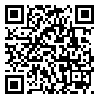Volume 4, Issue 3 (2024)
jpt 2024, 4(3): 201-218 |
Back to browse issues page
Download citation:
BibTeX | RIS | EndNote | Medlars | ProCite | Reference Manager | RefWorks
Send citation to:



BibTeX | RIS | EndNote | Medlars | ProCite | Reference Manager | RefWorks
Send citation to:
Parvazmanesh B. Soft Criteria of Epistemic Systems; from Sadraian Explanation to Application in Aristotelian Logic. jpt 2024; 4 (3) :201-218
URL: http://jpt.modares.ac.ir/article-34-76001-en.html
URL: http://jpt.modares.ac.ir/article-34-76001-en.html
Department of Philosophy and Logic, Faculty of Human Sciences, Tarbiat Modares University, Tehran, Iran
Abstract: (2117 Views)
The characteristics of epistemic collections are divided into two categories: accuracy (hard) and perfection (soft). The soft criterion focuses on the desired perfection; for example fluency and eloquence. This research considers the seven features of simplicity and clarity, proportionality and balance, correspondence, reciprocating, transition, symmetry and self-generation to be the most important components of soft criterion. This criterion is founded on a philosophical explanation based on transcendent wisdom. To achieve a further explanation of the components of this criterion, this indicator is included in some tables of logic, for example the table of co-true propositions. First, it is evaluated with the components of the soft criteria and while identifying some weaknesses and through philosophic analysis, in order to solve these cases, proposals are presented, implemented and improvements made to address them. The result was meaningfully positive and the suggestions increased the performance and beauty of the main tables. All the steps are descriptive-logical and the result is that with these revisions, the efficiency and usefulness of this table have increased.
Article Type: Original Research |
Subject:
Logic and Philosophy of Logic (Islamic)
Received: 2024/08/8 | Accepted: 2024/10/27 | Published: 2024/10/31
Received: 2024/08/8 | Accepted: 2024/10/27 | Published: 2024/10/31
References
1. Copleston FC (1993a). A history of philosophy (Volume 4). New York: Bantam Doubleday Dell. [Link]
2. Copleston FC (1993b). A history of philosophy (Volume 5). New York: Bantam Doubleday Dell. [Link]
3. Copleston FC (1993c). A history of philosophy (Volume 8). New York: Bantam Doubleday Dell. [Link]
4. Farmarz Qharamaleki A (2009). Logic (Volume 1). Tehran: PAYAM NOOR. [Persian] [Link]
5. Ibn Sina HA (NDa). The treatises. Qom: Bidar. [Arabic] [Link]
6. Khansari M (1980a). Formal logic (Volume 1). Tehran: AGAH. [Persian] [Link]
7. Khansari M (1980b). Formal logic (Volume 2). Tehran: AGAH. [Persian] [Link]
8. Mirdamad MB (1995). Flames of fire. Tehran: University of Tehran. [Arabic] [Link]
9. Mutahhari M (1997a). The collection of works (Volume 6). Tehran: Sadra. [Persian] [Link]
10. Mutahhari M (1997b). The collection of works (Volume 13). Tehran: Sadra. [Persian] [Link]
11. Muzaffar MR (2003). Logic. Fayazi QR, Commentator. Qom: Islamic Publication Institute. [Arabic] [Link]
12. Nabavi L (2010). The elements of modern logic and methodology. Tehran: Tarbiat Modares University Scientific Works Publishing Center. [Persian] [Link]
13. Nabavi L (2023). The elements of modern logic. Tehran: SAMT. [Persian] [Link]
14. Nasiral-Din Tusi M (1982). The basis of the adaptation. Tehran: University of Tehran. [Persian] [Link]
15. Sabzewari H (1990). Commentary on the poems (Volume 1). Tehran: Nab. [Persian] [Link]
16. Sadr Al-Din Shirazi M (1981). Deistic evidence in behavioral approaches. Tehran: University Publication Center. [Arabic] [Link]
17. Sadr Al-Din Shirazi M (1989). The transcendent philosophy of the four intellectual journeys (Volume 7). Qom: AL-MUSTAFAWI School. [Arabic] [Link]
18. Tabatabai MH (1995). The ultimate philosophy. Qom: Islamic Publication Institute Affiliated with the Society of Seminary Teachers. [Arabic] [Link]
19. Yazdi A (2004). Footnote of refinement of logic. Qom: Islamic Publication Institute. [Arabic] [Link]
| Rights and permissions | |
 |
This work is licensed under a Creative Commons Attribution-NonCommercial 4.0 International License. |






